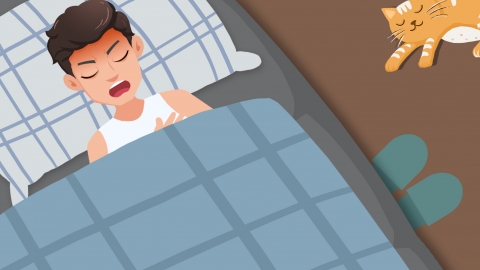Why is my body temperature above 37°C every night?
Body temperature above 37°C every night may be caused by physiological fluctuations, excessive physical activity before bedtime, colds, bronchitis, urethritis, etc. Adjustments such as regulating sleep schedules, reducing pre-sleep activities, medication, and physical cooling methods can help improve the condition. If body temperature consistently exceeds 37.5°C or is accompanied by symptoms like coughing or painful urination, prompt medical attention is recommended.

1. Physiological temperature fluctuations: Human body temperature follows a circadian rhythm. Due to changes in metabolic activity from late afternoon to nighttime, body temperature may slightly rise, typically not exceeding 37.5°C, without other discomforts. It is recommended to monitor daily temperature variations, avoid intense physical activity during evening hours, maintain good indoor ventilation, and regulate room temperature (22–25°C) to help the body maintain a comfortable thermal state.
2. Excessive activity before bedtime: Engaging in vigorous exercise such as running or jumping rope, or prolonged mental work before sleep, increases heat production in the body, leading to elevated nighttime temperature, possibly accompanied by mild sweating and increased heart rate. It is advised to reduce physical and mental activities 1–2 hours before bedtime. Relaxation techniques such as soaking feet in warm water or listening to soothing music can help gradually return body heat production to normal levels and prevent sustained elevation of body temperature.
3. Cold: Viral or bacterial infections affecting the nasal passages, throat, or related areas trigger inflammatory responses that disrupt the function of the body's temperature regulation center, resulting in nighttime fever accompanied by nasal congestion, sore throat, and runny nose. Under medical guidance, patients may use medications such as Compound Paracetamol and Amantadine Capsules, Lianhua Qingwen Capsules, or Ibuprofen Sustained-Release Capsules to relieve symptoms.
4. Bronchitis: Infection of the bronchi by bacteria, mycoplasma, or other pathogens causes inflammation of the bronchial mucosa. The inflammatory response leads to fever, which may worsen at night due to mucus accumulation, along with symptoms such as coughing and sputum production. Under medical supervision, treatment may include oral solutions such as Ambroxol Hydrochloride Oral Solution, Cefaclor Capsules, or Azithromycin Dispersible Tablets to alleviate symptoms.
5. Urethritis: Bacterial invasion of the urinary tract—commonly by Escherichia coli—triggers inflammation of the urethra, causing fever at night along with frequent urination, urgency, and painful urination. Symptoms can be managed with medications prescribed by a doctor, such as Levofloxacin Capsules, Cefixime Dispersible Tablets, or Sanjin Tablets.
Daily care should include adequate fluid intake to support metabolism, wearing loose and breathable sleepwear, maintaining proper warmth at night to avoid chilling, eating a light and easily digestible diet, and ensuring sufficient sleep to promote recovery.




